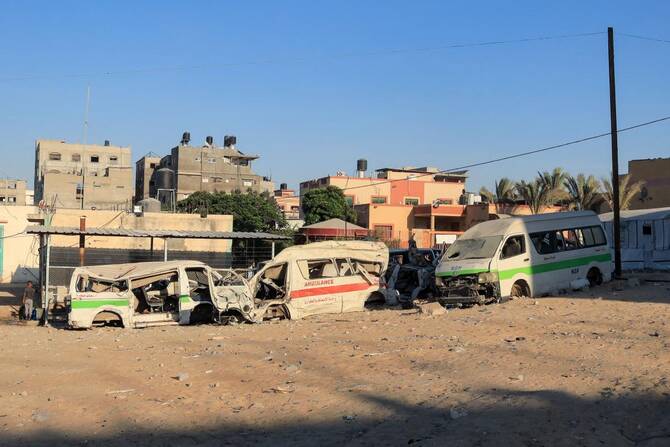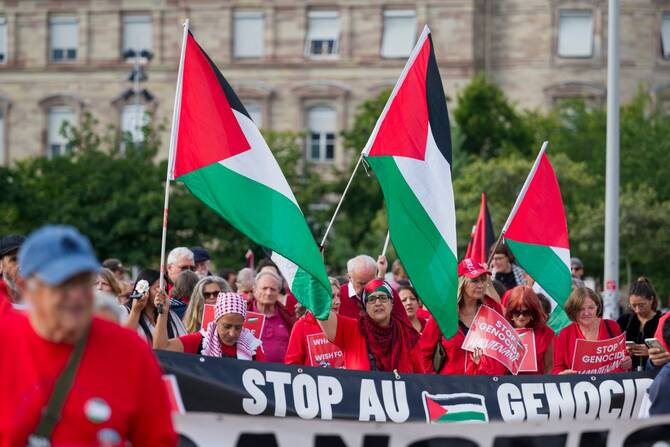GAZA CITY: Families of Palestinian detainees in Israeli jails have launched protests over the failure of prison authorities to take measures to prevent the spread of the coronavirus disease (COVID-19) among inmates.
In a move indicating the deterioration of conditions inside prisons, 5,000 Palestinian prisoners in 22 Israeli prisons warned the Israeli Prisons Authority to close sections, and said they would refrain from going out for exercise in the courtyards and would send meals back.
Najat Al-Agha 70, the mother of detainee Diaa, who has been imprisoned for 28 years, said that anxiety has prevented her from sleeping since the spread of COVID-19, because of her fears for her son and his mates in prison.
Al-Agha last visited her son in Nafha prison was in June, her first visit for two years.
She said: “The situation inside prisons is terrifying, and severe overcrowding brings diseases. It is 10 prisoners to a room, and the majority of them are sick and elderly.”
“The news that comes from inside the prisons is not reassuring, as the occupation has increased its pressure on the prisoners and its aggressive policies against them. Instead of taking measures to protect them from the virus, it withdrew a lot of food and sterilizers,” she said.
According to the Prisoners and Detainees Affairs Commission of the Palestine Liberation Organization, the Prison Authority recently withdrew 170 items from prison cafeterias, including foodstuffs, sterilizers and soaps, and rejected the prisoners’ demands to supervise prison kitchens instead of criminal detainees.
The head of the commission, Qadri Abu Bakr, said that Israel is practicing “slow killing” against the detainees, and is pushing the conditions inside its prisons toward an explosion.
Abu Bakr described prisons as a “fertile spot” for the spread of diseases and epidemics, as they are old, decrepit and overcrowded.
He said Israel rejected repeated demands by the Palestinian Authority and international organizations to release the prisoners, or at least the sick, the women and the children, to protect them from the risk of COVID-19 outbreaks in prisons, and did not respond to the authority’s willingness to provide doctors, preventive materials and sterilizers.
“While the countries of the world are taking exceptional measures to confront the virus and limit its spread, including the release of prisoners, Israel is showing regular disregard for the lives of thousands of prisoners,” he said.
Since the spread of the virus, the ICRC has intensified its dialogue with the detaining authorities (the Israel Prison Service), especially after the suspension of the visits program for families and lawyers and the exclusion of the ICRC delegates who were visiting prisons to familiarize themselves with living conditions and ensure health care.
Suhair Zaqout, a spokeswoman for the International Committee of the Red Cross in Gaza, said in light of the global health crisis caused by COVID-19, the detainees are the neediest category of attention and health care.
However, Zaqout said: “We do not speak publicly about the conditions of detention.”
“There are authorities around the world who released prisoners with the outbreak of the virus, and every authority does what it deems appropriate to prevent the spread of the virus, and the ICRC welcomes any action in this regard, and encourages the detaining authorities to be transparent,” Zaqout said.
The ICRC announced several days ago that it was discussing with the Israeli Prison Authority alternative mechanisms to ensure that prisoners would communicate with their families, following the suspension of the visits program.
The head of the International Commission for the Defense of the Rights of the Palestinian People, lawyer Salah Abdel Ati, stressed that real risks beset the lives of thousands of prisoners.
He said that Israel had not taken any measures to protect the lives of the prisoners, whether by releasing them, or at least providing them with tools of prevention, but had imposed more restrictions, which made them an easy “prey” for epidemics.
Israel violates these practices with regard to prisoners of international humanitarian law, and Abdel Ati expressed fears of a “disaster” among the prisoners, especially at this difficult time when the state of emergency looms over the entire world in response the dangers of COVID-19.






















